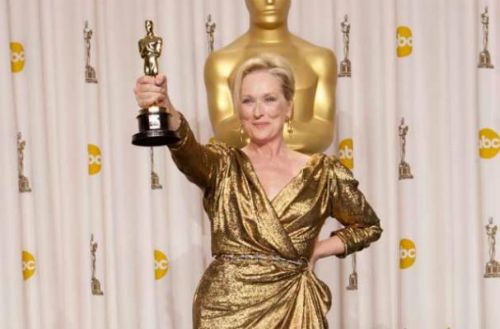
I wrote recently about Meryl Streep's portrayal of Margaret Thatcher in the movie Iron Lady.
Today, Streep has issued a long statement on Thatcher, once the subject of one of her films.
The full text is available here and which I've copied below.
Streep talks in typical liberal ambiguity. On the one hand, she admires Thatcher as a "feminist pioneer" who broke "through the ranks of the British political system" to become Prime Minister.
On the other hand, Streep cannot reconcile the more conservative views of Thatcher with her own left-liberal ones. She says, with carefully worded phrases:
[For Thatcher] to have managed to keep her convictions attached to fervent ideals and ideas – wrongheaded or misguided as we might see them now – without corruption – I see that as evidence of some kind of greatness...I ask Streep: Where are the "...women and girls around the world...[who] supplant[ed] fantasies of being princesses with a different dream: the real-life option of leading their nation"?
Where is the proliferation of women-leaders that Streep is talking about, twenty years after Thachter resigned from politics? There is the Australian Prime Minister, Julia Gillard, and Germany's Chancellor Angela Merkel. The smattering of Third World and Scandinavian female leaders have no strong and dominant position in world politics, and do not count. Hillary Clinton, for whatever reason, couldn't pull through as the first female President of the United States, and Ségolène Royal of France lost to Nicolas Sarkozy in 2007.
Two female world leaders.
Meryl Streep's full text is below.
Margaret Thatcher was a pioneer, willingly or unwillingly, for the role of women in politics.-------------------------------------------------------------------------------------------------------------------------------------
It is hard to imagine a part of our current history that has not been affected by measures she put forward in the UK at the end of the 20th century. Her hard-nosed fiscal measures took a toll on the poor, and her hands-off approach to financial regulation led to great wealth for others.
There is an argument that her steadfast, almost emotional loyalty to the pound sterling has helped the UK weather the storms of European monetary uncertainty.
But to me she was a figure of awe for her personal strength and grit. To have come up, legitimately, through the ranks of the British political system, class-bound and gender-phobic as it was, in the time that she did and the way that she did, was a formidable achievement. To have won it, not because she inherited position as the daughter of a great man, or the widow of an important man, but by dint of her own striving. To have withstood the special hatred and ridicule, unprecedented in my opinion, levelled in our time at a public figure who was not a mass murderer; and to have managed to keep her convictions attached to fervent ideals and ideas – wrongheaded or misguided as we might see them now – without corruption – I see that as evidence of some kind of greatness, worthy for the argument of history to settle. To have given women and girls around the world reason to supplant fantasies of being princesses with a different dream: the real-life option of leading their nation; this was groundbreaking and admirable.
I was honoured to try to imagine her late life journey, after power; but I have only a glancing understanding of what her many struggles were, and how she managed to sail through to the other side. I wish to convey my respectful condolences to her family and many friends.
Posted By: Kidist P. Asrat
